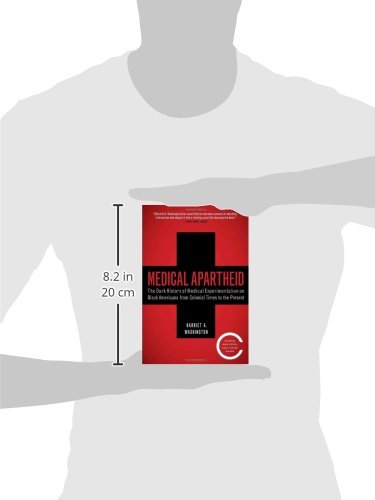Auteur: Washington, Harriet A.
Édition: Reprint
Nombre de pages: 528
Éditeur: Anchor
Date de sortie: 08-01-2008
Détails: Présentation de l’éditeur From the era of slavery to the present day, the first full history of black America’s shocking mistreatment as unwilling and unwitting experimental subjects at the hands of the medical establishment. Medical Apartheid is the first and only comprehensive history of medical experimentation on African Americans. Starting with the earliest encounters between black Americans and Western medical researchers and the racist pseudoscience that resulted, it details the ways both slaves and freedmen were used in hospitals for experiments conducted without their knowledge—a tradition that continues today within some black populations. It reveals how blacks have historically been prey to grave-robbing as well as unauthorized autopsies and dissections. Moving into the twentieth century, it shows how the pseudoscience of eugenics and social Darwinism was used to justify experimental exploitation and shoddy medical treatment of blacks, and the view that they were biologically inferior, oversexed, and unfit for adult responsibilities. Shocking new details about the government’s notorious Tuskegee experiment are revealed, as are similar, less-well-known medical atrocities conducted by the government, the armed forces, prisons, and private institutions. The product of years of prodigious research into medical journals and experimental reports long undisturbed, Medical Apartheid reveals the hidden underbelly of scientific research and makes possible, for the first time, an understanding of the roots of the African American health deficit. At last, it provides the fullest possible context for comprehending the behavioral fallout that has caused black Americans to view researchers—and indeed the whole medical establishment—with such deep distrust. No one concerned with issues of public health and racial justice can afford not to read Medical Apartheid, a masterful book that will stir up both controversy and long-needed debate. Extrait CHAPTER 1 SOUTHERN DISCOMFORTMedical Exploitation on the Plantation Celia’s child, about four months old, died last Saturday the 12th. This is two negroes and three horses I have lost this year. –DAVID GAVIN, 1855 Frederick Gardiner, a peripatetic Mormon physician, left among his travel memoirs an impression of the nineteenth–century slave markets of Washington, D.C.: There are a great number of Negroes, nearly all of whom are Slaves. And on different Streets are large halls occupied as Marts or stores, for the sale or purchase of Slaves. . . While I have been looking at one of these places on Gravier Street, Two Gentlemen have arrived, one of whom I have Seen in the Saloon, he is a young Planter and come to purchase a girl to take care of his children, or whatever duties he may think proper to impose upon her. The other person is a Doctor whom he has brought with him for the purpose of examining her. They pass along the front of the row in company with the agent or Salesman. As they move forward One is called upon to stand up, then another while a passive examination is made. Then finally he discovers a bright mulatto, who appears about 16 years of age and is quite good looking. She is ushered into a private room where she is stripped to a nude condition and a careful examination is made of all parts of the body by the Dr. and is pronounced by him to be sound. The money is then paid and she is transferred to her new owner…I have heard that the Masters beat and scourge them most cruelly. But I have not seen anything of the kind, nor do I believe that it occurs very often. For the southern people as a class are Noble minded kind hearted people, as can be found in any country…And moreover it would be against their own interests, to brutally treat their Slaves. As no planter desired to have sick negroes on his hands. According to my judgment so far as my experience extends, I believe that the Negroes as a class, are far more humanely treated and taken care of, Than are the laboring classes of Eu
Soyez le premier à laisser votre avis sur “Medical Apartheid: The Dark History of Medical Experimentation on Black Americans from Colonial Times to the Present” Annuler la réponse
Vous devez être connecté pour publier un avis.
























Avis
Il n’y a pas encore d’avis.